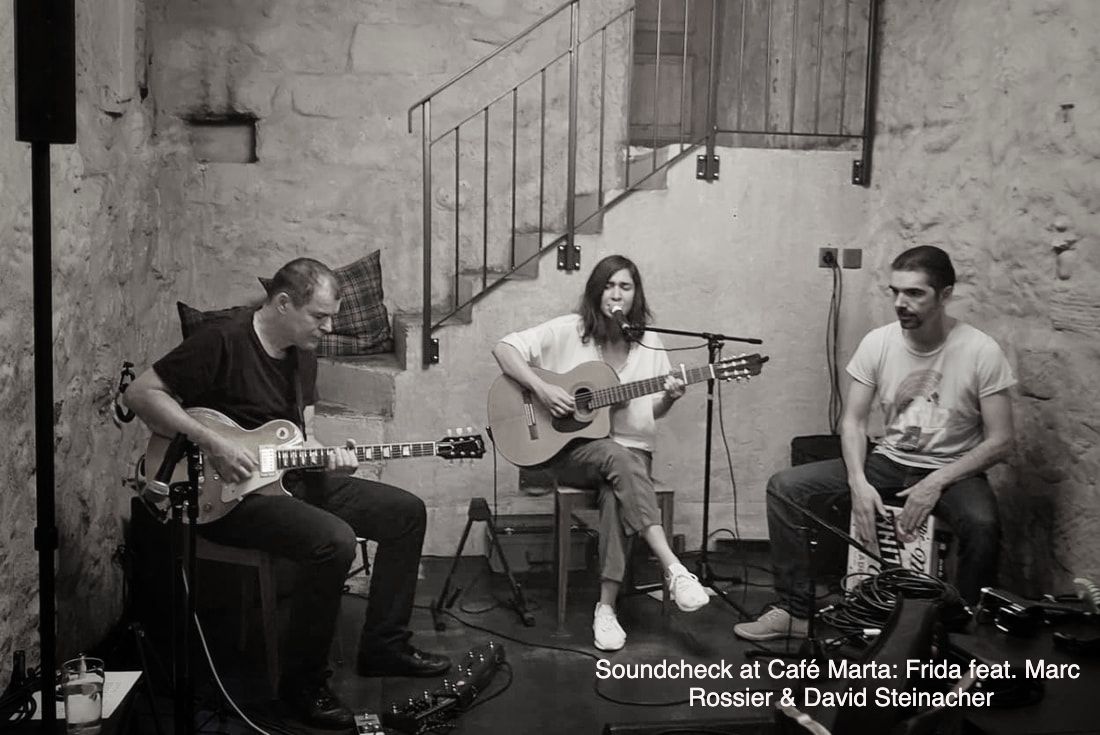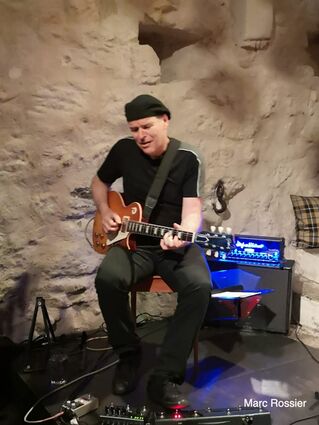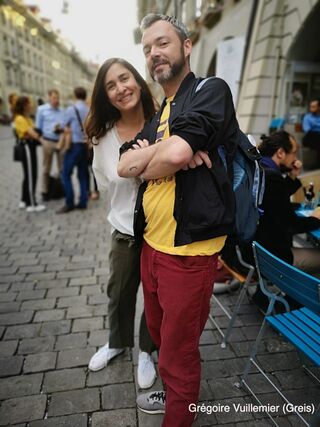Menu
|
photos by May Arida  “I want to see what will happen if I only do what feels right,” says Frida Chehlaoui - who on stage is simply Frida - to an audience eager to discover this emerging singer/songwriter coming from Lebanon. “I want to see what will happen if I just go ahead and try. And now I see where this attitude got me,” Frida continues, “it got me here to play my first concert in Europe. I am really very happy to be here." The here is Café Marta in Switzerland’s capital of Bern, a cosy cellar made of medieval brick walls in the city’s old town, turned into a café and an occasional concert venue. Frida is accompanied by Marc Rossier on guitar and David Steinacher on percussion, two well known musicians in the Bernese music scene and beyond. Frida had met them just a few days before the concert and two short rehearsals were all it took to make it a well tuned trio. Tonight Café Marta is the hottest place in town: the cellar is crammed with people - and so are the stairs leading down to the cellar and even the steps behind the stage -, it is hot outside and sticky inside and the incessantly revolving fans, despite of all their efforts, cannot make it any cooler. Frida was announced as Arab Soul from Beirut. But what was it exactly that brought such a large crowd to Café Marta on a midweek summer evening? The words Arab, Soul and Beirut all have their own particular connotations, an almost magical promise to discover an emotional territory not usually accessible to Western Europeans. However Frida is much more than what she seems to represent. Starting with a warm and slightly smoky voice, and the natural ability to talk to an unknown audience and make them listen to her, Frida’s universe mainly relies on three pillars: connecting to one’s higher frequency, co-creating and experimenting. All of this is topped by a roof that Frida calls “the role of joy in the creative process”. Why suffer to create when you can walk the path of least resistance and thus bring out the creator that lies in all of us? “I know things beyond the physical realm" As a child Frida signed her first poems as Free-da and thirty something years later this makes more sense than ever. “My connection with the audience is that they see someone on stage who is absolutely free in that moment,” Frida tells me when I interview her after the concert. “I am free to say what I want to say, free to do what I want to do, free to allow myself to feel what I am feeling without thinking if this is going into the right direction.* “What allows you to be this free?,” I ask her. “I know things beyond the physical realm,” Frida replies. Frida’s freedom doesn’t even stop when facing Nina Simone’s Sinnerman, a monument of black American music and one of two cover versions that Frida has in her repertoire. Not happy with the original lyrics (on Judgement Day the frightened Sinnerman goes to the rock, the river and then the sea, desperately looking for protection and finally turns to the Lord who refuses to help him and sends him to the devil instead), Frida added her own twist to the song, because after all the Lord is love and not supposed to send anyone to the devil, no matter how much this person may have sinned. “I see you,” sings Frida in Arabic, “I see the fear in your eyes, I see the chains you’re carrying, but you seem to have forgotten how you were the one who put them there. It is now time for you to see your power, the power of a thousand suns shining from within you, shining to remind you: don’t you know that you and I are one and the same?” This is extremely powerful and beautiful at the same time. Frida’s songs are meant to remind us who we truly are and that we should forget about the restrictions that we limit ourselves with, that we can be much more than we think. In “Out and About”, Frida describes how our bodies must open up to embody the light that we truly are. In “Aala Mahli” (going slowly) Frida tells us the story of the heart that must be our guide, the only guide we ever need. Frida herself is “Bint el Kol” (the daughter of everything); her homage to the divine feminine will also be the title track of Frida’s first album set to be released in September of 2019. Frida is the daughter of the wind, the daughter of the sun and of the waves (“like the waves I can be calm, like them I have been fierce”), she’s the daughter of the earth and the daughter of ether (“unseen and omnipresent, weaving us all into one”). Frida’s concert in Bern was a success beyond expectations. The audience was thirsting for her message of self-love and collective empowerment and for her well tempered dose of spirituality that many of us are lacking in our get-up-and-go lives. Visiting Bern has enabled Frida to meet musicians such as the exceptional accordionist Mario Batkovic and ECM recording artist and bassist Björn Meyer to talk about their approach to music and about possible future collaborations. Already Swiss rapper Greis joined Frida on two songs at Café Marta, subsequently inviting her to be his guest at his own concert later that week. Frida sang Ya Sadi’i (my friend) on this occasion and this song’s story “about the courage to chose the less traveled path to experience the magic unfold so we become the makers of our destinies”, is a story that speaks to all of us, regardless of our mastering the Arabic language or not. Frida’s message is an universal one. We need her to be the companion of our lives for many years to come.
1 Comment
|
EditorKurt is based in Bern and Beirut is his second home. Always looking for that special angle, he digs deep into people, their stories and creations, with a sweet spot for music. Archives
September 2020
Categories
All
I'd love to discover you. Share your creations here.
|



 RSS Feed
RSS Feed
